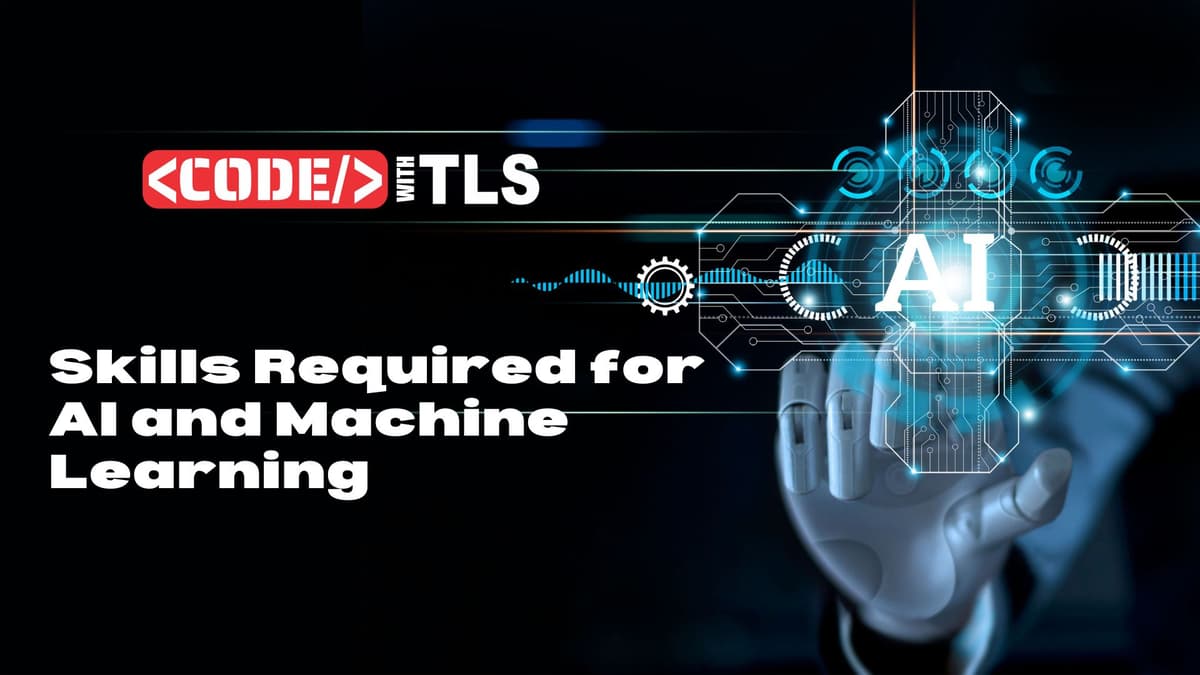
All Essential Skills Required for AI and Machine Learning
Published: 2024-12-06 13:16:38
The fields of Artificial Intelligence (AI) and Machine Learning (ML) are growing at an exponential rate, revolutionizing industries and creating new career opportunities across the globe. However, to succeed in this rapidly evolving domain, professionals must possess a robust set of skills that blend core technical expertise, mathematical foundations, and soft skills. Whether you're just starting or aiming to deepen your knowledge, understanding the skills required for AI and ML is key to excelling in this high-demand field. In this blog, we'll explore the core technical, mathematical, and soft skills needed for AI and ML professionals. We will also discuss how learning with TLS can help you acquire and master these essential skills.
Contact us for free Bootcamp guidance.
Core Technical Skills for AI and Machine Learning
- Python Programming: The Cornerstone of AI and ML
Python is by far the most popular programming language for AI and ML due to its simplicity, flexibility, and an extensive library ecosystem. Python’s readability and ease of use make it an ideal language for both beginners and seasoned professionals. It’s the primary language used in many AI/ML frameworks and libraries like TensorFlow, PyTorch, and scikit-learn.
Key Python Libraries and Tools to Learn:- NumPy: Essential for handling large datasets and performing numerical operations.
- Pandas: A powerful tool for data manipulation and analysis.
- Matplotlib/Seaborn: Used for data visualization, which is crucial for interpreting data insights.
- scikit-learn: A fundamental library for building machine learning models, including regression, classification, and clustering.
- Deep Learning Frameworks: TensorFlow and PyTorch
AI and ML models, especially in the realm of deep learning, rely heavily on frameworks like TensorFlow and PyTorch. These frameworks are used to design, train, and evaluate neural networks and other complex models.- TensorFlow: Developed by Google, TensorFlow is a powerful open-source library widely used for building deep learning models. It’s suitable for both research and production environments, providing tools for deploying models in various environments, such as mobile and cloud-based applications.
- PyTorch: Developed by Facebook, PyTorch has gained immense popularity among researchers and professionals due to its dynamic computation graph, ease of debugging, and seamless integration with Python. It’s often preferred for academic research and rapid prototyping of ML models.
- Mastering these tools allows you to build sophisticated models, optimize performance, and deploy solutions at scale.
- Machine Learning Libraries and Algorithms
AI and ML professionals must be proficient in a range of libraries and algorithms, from supervised learning techniques like linear regression and decision trees to unsupervised methods like clustering and dimensionality reduction. Libraries such as scikit-learn and XGBoost are staples for implementing these algorithms efficiently.
Additionally, a solid understanding of model evaluation techniques (such as cross-validation, precision-recall, and ROC curves) and hyperparameter tuning is crucial to building accurate and robust models.
- Big Data Technologies
AI and ML professionals often work with massive datasets. Understanding big data tools such as Hadoop, Spark, and Kafka can be beneficial for handling, processing, and analyzing data efficiently. These tools enable data scientists and ML engineers to scale their algorithms for high-performance computing environments.
To Join Our Classes, Visit Here:
Ready to master AI, ML, and more? Start your learning journey with Code with TLS! Join our classes today.
Mathematical Skills for AI and Machine Learning
While technical tools and frameworks are essential, a strong mathematical foundation is equally critical for developing a deeper understanding of how AI and ML algorithms function and why they work. Key mathematical concepts include:
- Linear Algebra: The Backbone of AI
Linear algebra is fundamental to understanding many machine learning algorithms, especially in deep learning. Concepts like matrices, vectors, eigenvalues, and eigenvectors play a pivotal role in training neural networks, optimizing models, and representing data.
For example, during backpropagation in neural networks, gradients are computed through matrix operations, which are derived from linear algebra principles.
- Probability and Statistics: Understanding Uncertainty and Data
Machine learning deals with uncertainty, and probability theory helps model that uncertainty. A solid grasp of probability distributions, Bayesian methods, statistical inference, and hypothesis testing is essential for understanding how models make predictions and assess their reliability.
For instance, algorithms like Naive Bayes and Gaussian Mixture Models rely heavily on probability theory. Understanding statistical techniques also aids in designing experiments and interpreting results effectively.
- Calculus: Optimization and Backpropagation
Calculus is indispensable for understanding how machine learning models learn and improve over time. Specifically, derivatives are used for optimization techniques like gradient descent, which is the method used to minimize the loss function in neural networks.
A strong foundation in calculus helps professionals tune models effectively and make informed decisions about training algorithms and performance metrics.
Join Our Coding Bootcamp:
Take the next step towards a successful tech career! Join our Coding Bootcamp and get hands-on experience in AI, Data Science, and more.
Soft Skills for AI and Machine Learning Professionals
While technical and mathematical skills are at the heart of AI and ML, soft skills are equally important. The ability to think critically, solve complex problems, and communicate effectively can differentiate a good AI/ML professional from a great one.
- Problem-Solving Skills:
AI and ML projects often involve tackling complex, real-world problems where the solutions are not immediately clear. Professionals must break down these problems into manageable parts, select the right techniques, and experiment with different models to find the most effective solution.
- Critical Thinking:
Critical thinking helps AI and ML professionals assess the strengths and weaknesses of various models, validate results, and make informed decisions. They need to evaluate the assumptions behind the algorithms they use and ensure that the models they build are robust, interpretable, and scalable.
- Communication Skills:
AI and ML professionals often work in interdisciplinary teams with people from diverse backgrounds, including business analysts, data engineers, and domain experts. Being able to communicate complex technical concepts in simple, clear terms is crucial for collaboration and ensuring that the solutions align with business objectives.
- Collaboration and Adaptability:
The fast-paced and ever-evolving field of AI/ML demands professionals who can adapt to new technologies, learn from failures, and collaborate effectively with teams to create innovative solutions.
Also check out :- AI ML Course Syllabus
AI Machine Learning Courses Faqs
How Learning with Code with TLS Can Help You Master AI and ML Skills
Acquiring the diverse set of skills required for AI and ML can be challenging, but with the right guidance and resources, the learning process becomes significantly easier. This is where Code with TLS can make a major difference. Code with TLS offers a comprehensive and structured learning approach designed to equip you with the core technical, mathematical, and soft skills needed to excel in AI and ML. Here’s how TLS can accelerate your learning journey:
- Hands-On Projects:
Code with TLS provides real-world projects and case studies that allow you to apply theoretical knowledge to practical scenarios. These hands-on exercises will help you master tools like Python, TensorFlow, and PyTorch, and gain familiarity with essential machine learning algorithms.
- Mathematics for Machine Learning:
Code with TLS offers specialized modules on the mathematical foundations of AI/ML, ensuring that you grasp the essential concepts of linear algebra, probability, statistics, and calculus. This knowledge is crucial for understanding the inner workings of machine learning algorithms and improving their performance.
- Expert Mentorship:
Code With TLS, you get the opportunity to learn from industry experts who can provide guidance, clarify doubts, and offer insights into the latest trends and best practices in AI/ML. Having a mentor accelerates learning and helps you navigate challenges more effectively.
- Comprehensive Learning Pathways:
Code with TLS’s curriculum is designed to take you from beginner to expert level. Whether you are new to programming or have some prior experience, step-by-step learning modules will ensure you build a solid foundation and gradually progress to advanced topics in machine learning and AI.
- Collaboration and Networking:
Code with TLS provides access to a community of learners, where you can collaborate on projects, share ideas, and solve problems together. This fosters an environment of continuous learning and peer support, which is invaluable in a field as complex as AI/ML.
- Certification and Job Assistance:
After completing the courses, Code with TLS provides recognized certifications that can enhance your resume and make you more competitive in the job market. Additionally, TLS offers job assistance programs, helping you connect with top employers in the AI and ML industries.
Conclusion
To succeed in AI and Machine Learning, professionals must develop a balanced skill set that includes technical expertise, a strong mathematical foundation, and key soft skills. Python, TensorFlow, and PyTorch are essential tools, while mathematical concepts like linear algebra, probability, and calculus form the backbone of effective algorithm development. Additionally, problem-solving, critical thinking, and communication skills are crucial for navigating real-world challenges.
Learning with TLS can provide you with the tools, resources, and expert guidance needed to master these skills. By joining TLS, you’ll be on the fast track to becoming an AI/ML professional ready to tackle the most complex problems and make a lasting impact in this exciting field.

